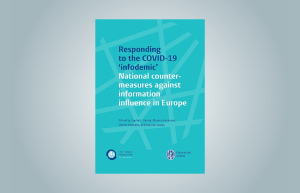 Wie Desinformation über COVID-19 in Deutschland bekämpft wird und welche Rechtsfragen sich in dem Zusammenhang stellen, erläutern Prof. Dr. Matthias C. Kettemann und Martin Fertmann in ihrem Beitrag zu einer Paper-Sammlung des „The Hague Program for Cyber Norms“ und der Universität Leiden.
Wie Desinformation über COVID-19 in Deutschland bekämpft wird und welche Rechtsfragen sich in dem Zusammenhang stellen, erläutern Prof. Dr. Matthias C. Kettemann und Martin Fertmann in ihrem Beitrag zu einer Paper-Sammlung des „The Hague Program for Cyber Norms“ und der Universität Leiden.
Auszug
Throughout the pandemic, Germany has taken a careful stance in responding to influence operations. Historically, it is not disinformation but hate speech that has taken the front and center position in the German platform regulation discourse. The notion that the process of political opinion formation is supposed to be free from state intervention (Staatsferne des Meinungsbildungsprozesses) is valued as a key element of Germany’s constitutional order, coupled with clear rules against specific types of serious antisemitic and other qualified hate speech and dehumanising expressions. Outside of illegal expressions, too large an influence of domestic authorities on the process of negotiating the rules of information behaviour is viewed as an even greater risk to the country’s liberal democracy than the risks associated with foreign influence operations.
Kettemann, M. C.; Fertmann, M. (2021): Germany: Much Ado about Little. In: Vériter, S.; Kaminska, M.; Broeders, D.; Koops, J. (Hrsg.): Responding to the COVID-19 ‘infodemic’: National countermeasures to information influence in Europe (The Hague: The Hague Program for Cyber Norms. December 2021), https://www.thehaguecybernorms.nl/research-and-publication-posts/responding-to-the-covid-19-infodemic-national-countermeasures-against-information-influence-in-europe, 27-32.

